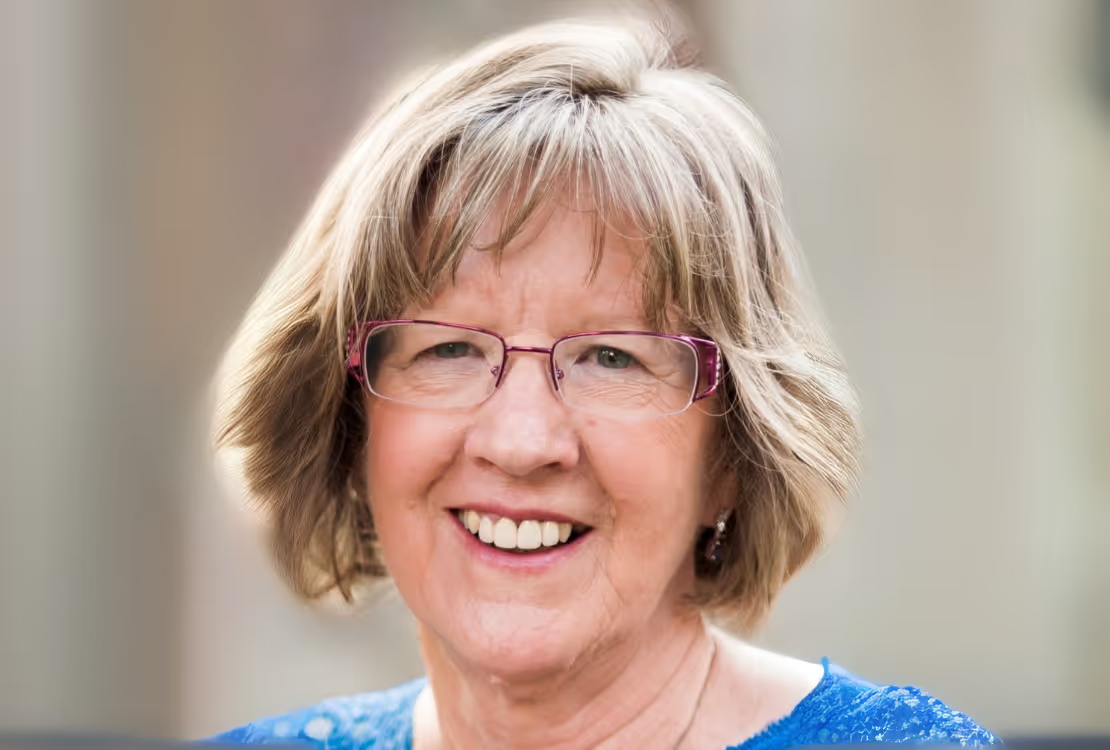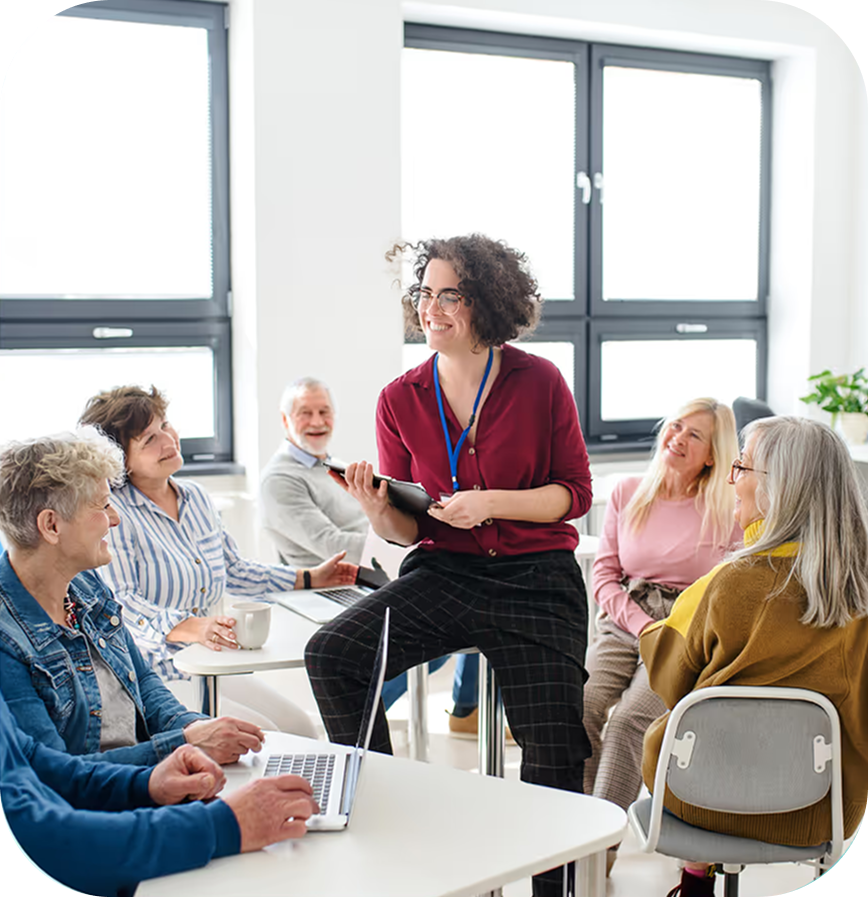Empower Lives with
Expert Cancer Coaching
The Cancer Health and Wellness Coach (Cancer Coaching) Training Program is comprised of 82 hours of interactive learning modules (18 hours of self-directed asynchronous sessions and 9 full day instructor-led online classes). This interactive, competency-based program incorporates experiential learning through live simulation sessions with patient actors, providing real-world practice to enhance decision-making, communication, and problem-solving skills

Skills You will Gain
Wellness Assessment
Cancer Self Management Support
Motivational Interviewing
Advanced Communication Skills
Health & Wellness Coaching
Positive Psychology Coaching

Healthville Advantage
NBHWC Accredited Course - Healthville’s Cancer Health & Wellness Coach Training Program stands apart for its depth, credibility, and real-world connection. Unlike general wellness or coaching courses, Healthville is fully NBHWC-accredited and designed specifically for those supporting individuals living with and beyond cancer. Graduates gain board eligibility and national recognition
Course designed by an Emeritus Scientist, Dr. Doris Howell from the World Renowned Princess Margaret Cancer Centre in Canada and expert in Health and Wellness Coaching
Experiential Learning
Refine and validate your skills through practical assessments, including one-on-one summative evaluations and live small-group simulations with patient actors.
At the program’s conclusion, receive personalized skills assessments with instructor feedback on health and wellness coaching competencies. Engage in realplay simulations, stepping into the role of a health & wellness coach in real-world scenarios. A facilitator will provide guidance, insights, and constructive feedback throughout the process.

Journey to Healthville Cancer Coach
Take the Online Training
You can complete the course within three months, seamlessly progressing through a structured learning journey that includes instructor-led sessions, self-paced asynchronous modules, and hands-on experience with standardized patients.
Launch Your Coaching Practice with Healthville
As a Healthville Cancer Coach, you become an integral part of our Cancer Managed Services Ecosystem, gaining full access to our worldwide cancer patient network and the Healthville Service Platform.
This allows you to seamlessly engage with patients, apply your coaching expertise in real-world scenarios, and leverage our tools and resources to provide personalized, high-impact support.
Join us Full-time
Select graduates will have the exclusive opportunity to join Healthville as full-time Cancer Coaches. With us, advance into leadership roles, including becoming a Cancer Coach Trainer, where you can mentor and shape the next generation of Cancer Coaches, further expanding your impact within the Healthville ecosystem.
Start Your Own Practice
Expand your impact and elevate your practice by integrating Cancer Coaching into your existing patient care model or by launching a brand-new Cancer Coaching practice from the ground up.
Whether you’re a healthcare provider looking to enhance your services with specialized cancer support or an entrepreneur eager to build a meaningful, patient-focused practice, our program equips you with the expertise, tools, and ecosystem access to succeed.
Mentoring
For the First 25 registrants in 2025, receive three personalized mentoring sessions with a certified Cancer Coach, designed to support your transition into practice.
Mentorship will be comprised of three online sessions; and you may choose an area of focus for skill building and/or discussion of your career directions
These sessions can be scheduled within three months of completing your certification program
How will you benefit
Trusted Path to Board Certification
The Healthville Cancer Health and Wellness Coach Program is one of the most comprehensive and credible training programs available for those looking to support cancer patients holistically
Career Advancement
in Cancer Coaching
Leverage your existing knowledge to launch, upskill, or enhance your career focused on cancer care coaching.
Whole Person
Assessment Skills
Describe and apply the essential elements of a whole person cancer, health history, and self-management capability assessment for identification of collaborative problem-identification
Master Behavioral Change and Health Promotion Strategies
Enhance your practice with a cancer-focused model of care that can be implemented and scaled within your organization or private practice.
Access to Healthville Cancer Support Ecosystem
Exclusive access to Healthville's growing support ecosystem of patients and support providers.
Professional
Certification
You have the opportunity to earn at the end of the program, on successful completion of all mandatory requirements – a NBHWC recognized Cancer Health and Wellness (Cancer Coach) Certificate of Completion.
Entry Requirements:
Regulated health professionals in Canada practicing in fields such as nursing,
psychology, kinesiology, chiropractic, dietetics, homeopathy, TCM/acupuncture,
naturopathy, medicine, etc,
OR
Internationally educated health professional (e.g., Internationally Educated
Nurses (IENs), International Medical Graduates (IMGs)) holding an active license
from their home country
OR
Professionals holding a college diploma/associate’s degree or higher in a health-
related field (e.g., public health, health promotion, psychology (unlicensed),
kinesiology (unlicensed), with a strong academic foundation in human anatomy,
physiology, and the pathophysiology of chronic conditions acquired through
university or college-level coursework
OR
Applicants without a healthcare license may be considered if they hold a college
diploma/associate’s degree or higher AND have at least two years of practical
experience working within the healthcare sector in primary care, community care,
specialty clinics, hospitals, pharmacies, and other clinical settings.
OTHER REQUIREMENTS:
All programs at Healthville are delivered in English. It is the participant’s
responsibility to ensure they meet the required language proficiency before
enrolling.
Applicants may be required to provide proof of their English language proficiency
as part of the registration process.

Become a Certified
Cancer Coach
From anywhere in the world
FAQs
Find answers to common questions about our Cancer Coach Training Program.
Becoming a Cancer Health & Wellness Coach is more than a career choice—it’s a commitment to lifelong learning, mastery, and a passion for making a meaningful impact on the lives of those affected by cancer. As a rapidly emerging profession, cancer coaching offers both financial opportunities and a deeply rewarding career path. Whether you choose to build an independent coaching practice, integrate your expertise into medical or health-related settings, or join Healthville’s global ecosystem of cancer coaches, you’ll be equipped to empower individuals and families through expert guidance and compassionate support.
Our cancer coaching program may be eligible to count towards continuing education activities required by your health professional regulatory college or association. Healthville will provide you with a certificate of completion that includes hours of training completed that you can submit to your college but we do not submit documents directly. Please check the specific requirements of your college for eligibility as they may differ by profession and region.
The NBHWC accreditation certifies that our program meets the highest industry standards, ensuring a rigorous, evidence-based, and client-centered approach to health and wellness coaching. This recognition guarantees that students receive a comprehensive education that prepares them to deliver effective, professional coaching. Upon completing the course modules, graduates will be eligible to sit for the NBHWC exam, earning the prestigious National Board Certified Health & Wellness Coach (NBC-HWC) credential, which enhances credibility and expands
This course is designed for regulated health professionals with a university or college degree in fields such as nursing, medicine, psychology, social work, dentistry, health promotion, kinesiology, occupational therapy, physiotherapy, nutrition, or other health-related disciplines. Internationally trained medical doctors are also eligible.
Applicants without a healthcare license may be considered if they hold a degree and have at least two years of experience in the health and wellness coaching field.
Our program follows a hybrid learning model, combining self-paced (asynchronous) learning with live, interactive online sessions (synchronous via Zoom) for a comprehensive and flexible learning experience.
The self-guided component—completed in the four weeks prior to online classes—focuses on the unique health challenges, self-management strategies, and concerns of individuals across the cancer continuum (prevention, treatment, survivorship, and advanced disease).
The live online classes incorporate a multi-modal learning approach, including instructor-led lectures, peer practice, demonstration videos, pre-readings, coaching simulations, and interactive exercises to support diverse learning styles.
A standout feature of our program is simulated learning, where participants engage in real-life cancer coaching scenarios with trained actors portraying patients facing cancer-related health challenges, ensuring practical, hands-on experience in a safe, supportive environment.
Our instructors are globally recognized educators, researchers, and practitioners with expertise in cancer, nursing, kinesiology, and psychology. They have made significant contributions to their fields and are deeply committed to advancing cancer care through evidence-based health coaching.
With extensive practical experience in supporting individuals with cancer, our faculty members bring cutting-edge insights into the unique health challenges faced across the cancer continuum. Many hold specialized certifications, including:
Motivational Interviewing Network Trainers (MINT)
Pre-habilitation & Exercise Specialists
Certified Psychotherapists
Each instructor is dedicated to enhancing student learning through expert guidance, interactive training, and hands-on coaching techniques. You can explore their credentials and professional backgrounds in the course descriptions on our website. CLICK HERE to learn more about our instructors.
Applying is simple! Contact us through our website, and our Training Coordinator will personally reach out to:
- Answer any questions you may have
- Provide guidance on the application process
- Send you the enrollment form
Once your eligibility is confirmed, you will be required to submit a deposit toward the full tuition payment. Before the course begins, you will be scheduled for an orientation session, ensuring you are fully prepared for the program.
Our classes are intentionally small, typically accommodating 10 to 15 students, with a maximum cap of 20 to ensure personalized instruction and an interactive learning environment.
- After completing the self-paced (asynchronous) component, you will attend 9 weekly online classes, each lasting 7.5 hours per day.
- The total instructional time for the course is 82 hours, with an additional 1-2 hours of out-of-class study per week.
- At the end of the program, you will complete a multiple-choice test and participate in a 2-hour simulated cancer coaching session, where your health and wellness coaching competencies will be evaluated on a pass/fail basis.
Our program is designed to provide extensive hands-on experience in health and wellness coaching, ensuring you build confidence and proficiency in real-world applications.
✔ Integrated Coaching Practice: Each course module includes guided skill-building exercises to reinforce coaching techniques.
✔ Peer Coaching Sessions: You will complete two structured peer coaching sessions to refine your approach in a supportive environment.
✔ Half-Day Live Coaching Practice: Participate in a dedicated in-class coaching session with peers, where you will apply techniques learned throughout the course.
✔ Full-Day Simulated Coaching Experience: Engage in realistic coaching simulations with a trained standardized cancer patient, allowing you to develop, test, and refine your coaching skills in a safe, supervised setting.
This structured progression of practice-based learning ensures you gain practical expertise, preparing you to confidently support individuals facing cancer-related challenges.
As a student, you’ll have access to a comprehensive suite of learning resources designed to support your growth, both during and beyond the course.
✔ Extensive Course Materials: Includes lecture notes, supplementary readings, interactive learning modules, and industry-leading coaching tools.
✔ Case Studies & Skill Development: Each class integrates real-world case studies, coaching simulations, and hands-on practice to reinforce learning.
✔ User-Friendly Online Learning Platform: Easily accessible anytime, allowing you to review materials, revisit lessons, and track progress at your own pace.
✔ Ongoing Mentorship: 3 mentoring sessions are included. You may opt for more mentorship support to further develop your coaching expertise (available for an additional fee).
Our goal is to provide everything you need—from foundational knowledge to practical application and post-course support—ensuring you’re fully equipped for success as a Cancer Health & Wellness Coach.
Health and wellness coaching is a versatile and in-demand skill set, opening doors to a wide range of career opportunities across healthcare, corporate, and private sectors. As a certified Cancer Health & Wellness Coach, you can apply your expertise in:
✔ Private Practice: Establish your own independent coaching business, offering personalized cancer coaching and wellness programs.
✔ Healthcare & Rehabilitation Centers: Support patients as part of integrative oncology teams, survivorship care programs, or rehabilitation services in hospitals and clinics.
✔ Corporate Wellness Programs: Work with organizations, insurance providers, or employee wellness initiatives to promote cancer prevention, recovery, and resilience strategies.
✔ Fitness & Wellness Centers: Integrate cancer coaching into lifestyle medicine, exercise oncology, and holistic wellness programs.
✔ Nonprofits & Community Health Initiatives: Partner with cancer support organizations and advocacy groups to provide education, coaching, and emotional support to individuals affected by cancer.
✔ Healthville is always looking to hire Cancer Coaches, in full time or consultant roles.
Whether you pursue an entrepreneurial path, clinical role, or corporate position, this certification equips you with the skills to make a meaningful impact in the lives of those affected by cancer
**Mentorship**
As a participant in the Health and Wellness Coach (Cancer Coach) Training Program we value our commitment to helping you grow and achieve your goals to be the best coach you can be, to help people with cancer to optimize their health and wellness. Our mentorship support will focus on supporting you in deepening your coaching skills through one-on-one practice with one of our instructors or a practicing Healthville cancer coach, and/or offering career advice. Mentorship will be comprised of three online sessions; and you may choose an area of focus for skill building and/or discussion of your career directions
The total course fee is CAD$4,950, with an initial deposit of CAD$495 required at the time of registration. The remaining balance is due before the course start date.
Refund Policy:
If we must cancel the course—for example, due to insufficient enrollment (minimum of four students)—you will receive a full refund. If you request a refund, the following policies apply:
Refund Deadlines:
Refund requests must be submitted before the course begins. The earlier the request, the higher the refund eligibility.
Refund Amounts:
Full refunds may be available for early requests.
Partial refunds may apply for later requests.
No refunds will be granted beyond a certain deadline.
Administrative Fees: A processing fee may be deducted from refunds to cover administrative and enrollment costs.
Processing Time: Refunds will be issued via the original payment method and may take a certain period to reflect in your account.
For further details or to request a refund, please contact info@healthville.ca



%201.png)
.svg)
.svg)
.svg)
.png)
.png)
%201.png)

.svg)
.svg)
.svg)
.svg)
.svg)
.svg)